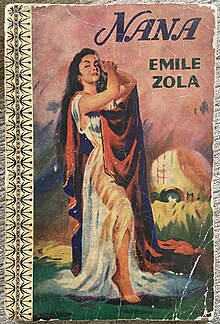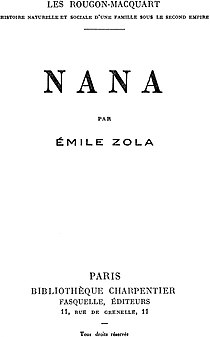Nana (novel)
Halévy told him innumerable stories about the amorous life of the star, Anna Judic, whose ménage à trois served as the model for the relationships of Rose Mignon, her husband, and Steiner in Zola's novel.
Yet it was Valtesse de la Bigne, painted by both Manet and Henri Gervex, who most inspired him; it is she who is immortalised in his scandalous novel Nana.
Nana first appeared near the end of L'Assommoir (1877), Zola's earlier novel in the Rougon-Macquart series, where she is the daughter of an abusive drunk.
When asked to say something about her talents, Bordenave, the manager of the theatre, explains that a star does not need to know how to sing or act: "Nana has something else, dammit, and something that takes the place of everything else.
It comes out that she has been living with a Russian prince, leaving her infant son in the care of an aunt near Paris, but when a smallpox epidemic breaks out she returns to nurse him; he dies, and she catches the disease.
Le Voltaire, the French newspaper that was planning to publish it in installments beginning in October 1879, launched a gigantic advertising campaign, raising the curiosity of the reading public to a fever pitch.
When Charpentier finally published Nana in book form in February 1880, the first edition of 55,000 copies was sold out in one day.
In summation he wrote: "Nana tourne au mythe, sans cesser d'être réelle".
)[3] As a counterargument to Zola's depiction of the significance of heredity and environment, Alfred Sirven (1838-1900) and Henri Leverdier (1840- ) wrote a novel called Nana's Daughter: A Story of Parisian Life (1880).
Published in both French and English versions, it told the story of Nana's daughter, who rises from "the gutter" and overcomes her background to become a respectable lady.
They were " bulbous, archetypal maternal figures like Mexican piñatas painted in bold colors and decorated with crisp, cartoon outlines".

